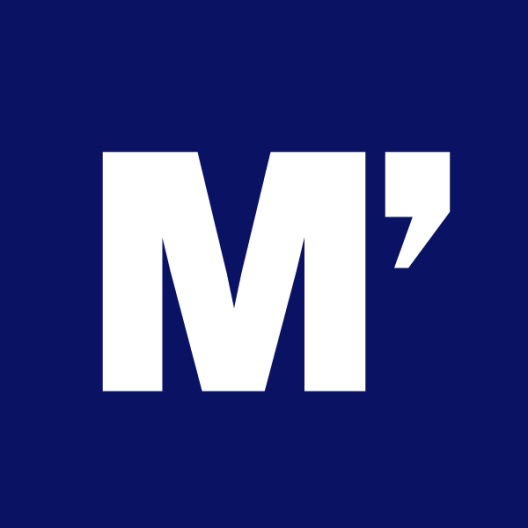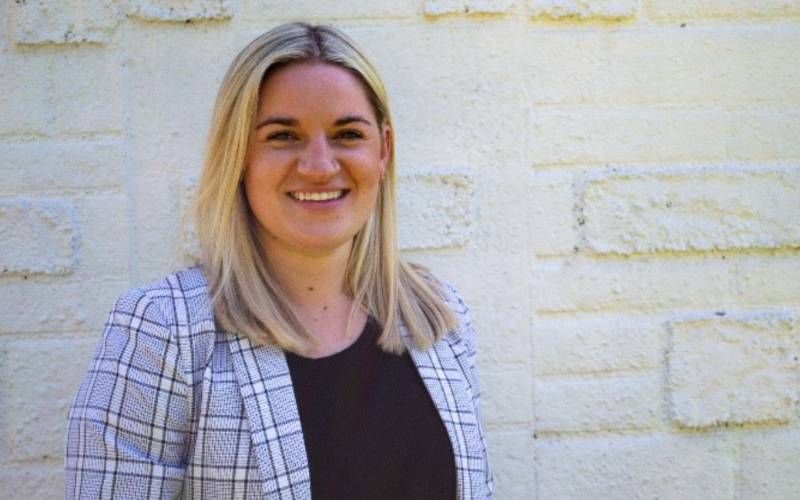
Empowering women: Abi Sawyer on resilience and inspiration
Interviews
Abi Sawyer, Customer Success Manager at Moody’s Corporation, spoke to myGwork for International Women's Day about the many inspirational women who have motivated her over the course of her career and personal life. She also offers a perspective on how her identities as a woman and as an LGBTQ+ person intersect, and provides advice for people experiencing discrimination or bias in the workplace.

Hi Abi! Thanks for chatting to us. Can you tell us a bit about yourself?
My name is Abi Sawyer and I am a Customer Success Manager on the Analytics side of Moody’s Corporation, based in Manchester. In my role, I focus on assisting our clients within our Strategic Insurance sector. We strive to maximise the benefits our customers derive from Moody’s products and solutions. Outside of my professional life, I have a passion for field hockey, cherish exploring the world solo, and I am a huge supporter of women's football. Also, crime thriller novels are my go-to choice for reading.
To start, could you share some inspiring stories of women who have made a significant impact in their communities or industries?
Alex Scott is a former professional footballer and sports broadcaster. She is best known for her time at Arsenal, where she won numerous titles, and for representing England in multiple World Cups and European Championships. After retiring from professional football, Scott became a respected sports pundit and television presenter. She is also an advocate for diversity and inclusion in sports and has spoken openly about the challenges she faced as a woman of colour and her experiences of sexism and racism in the industry.
Leah Williamson is another prominent figure in women's football. Currently playing for Arsenal and the England national team, she is known for her versatility and leadership on the pitch. Off the field, Williamson uses her platform to advocate for gender equality in sports and has been involved in initiatives that aim to increase participation and investment in women's football. Although Williamson has not publicly identified as queer, she has been a vocal ally of the LGBTQ+ community.
Lady Gaga (Stefani Joanne Angelina Germanotta) is a world-renowned singer, songwriter, and actress. She has been a trailblazer in the music industry, known for her distinctive style and powerful performances. Gaga identifies as bisexual and has been a fierce advocate for LGBTQ+ rights throughout her career. She founded the Born This Way Foundation in 2011, which aims to support the mental health of young people and build a more inclusive and kinder world.
I read Alex Scott’s inspirational book, “How (not) To Be Strong” where she discusses life’s hardships and how she has overcome them to make a career in punditry as a LGBTQ+ woman of color, after her retirement from professional sport. This was hugely impactful to someone who was so passionate about sport at university. After university I struggled to determine where I wanted to take my career outside of a world of sport that was my life. Being a student athlete at university and a competitive sportswoman, I’ve really benefited from seeing players like Leah Williamson fight for accessibility for women and young girls around the world to be able to play sport.
Having a female leader who stands with the LGBTQ+ community on a center stage for international sport, has given me inspiration and drive to exude similar behaviors. These women are my role models, as they combine some of my favorite passions. I had the fortunate experience of attending a Lady Gaga concert at the Mets Stadium in New York. I was moved by her powerful rendition of "Come to Mama", a song written to tackle themes of unity, love and the need for understanding empathy in the world.
Can you tell us about your experiences as a woman in the workplace, particularly any challenges you have faced and how you have overcome them?
In my own experience, workplaces and work culture in predominantly male environments can pose a significant challenge for women. The root of these issues very often lies in gender stereotypes, biases, and disparity in treatment. These systemic problems have occasionally led me to feel overlooked or disregarded. Something that works for me is setting clear boundaries and aligning expectations. This involves asserting my role and where I could add value, and then actively communicate that to my working group.
In what ways do you believe being an LGBTQ+ woman impacts your experiences in the workplace, and how do you navigate any unique challenges that arise?
I feel that being an LGBTQ+ woman can be even more challenging as we are more underrepresented than women generally. And this feeling can negatively affect our workplace experience and motivation to become top experts in our fields. But participation in the LGBTQ+ community within Moody's has enriched my perspective on how peers and colleagues tackle situations and propose solutions, even if it differs from the approach I would take. This community provides a platform for discussing the impacts and challenges of shared experiences, such as microaggressions and bias. The exchange of these experiences fosters mutual learning and understanding.
Share with us some personal successes or achievements you are proud of as an LGBTQ+ woman in your professional life.
My proudest achievement so far is my role as co-chair for the EMEA Pride Business Resource Group at Moody's. This position has been a source for learning, guidance, and growth, particularly in areas of the LGBTQ+ community that were previously unfamiliar to me. It also emphasized the value of creating an inclusive environment for all LGBTQ+ employees, irrespective of their gender identity. Additionally, this experience has improved my leadership skills, revealing abilities I didn't realize I possessed. In some ways it has encouraged me to strive for bigger achievements, always be open to constructive feedback and, above all, to be proud of who we are.
How do you see the intersectionality of being a woman and being LGBTQ+ influencing your professional journey, and how do you use it to your advantage?
The majority of companies are increasingly recognizing the importance of workplace diversity, viewing it as a business imperative. This shift is enriching workplaces with a diverse array of perspectives and ideas, thereby stimulating creativity. As someone who has faced and overcome social biases and prejudice, I have developed a robust resilience that serves me well in problem-solving and leadership roles.
Share with us a personal story or experience where you felt empowered and embraced as an LGBTQ+ woman in the workplace, especially during the celebration of International Women's Day.
I have found empowerment through hosting events featuring LGBTQ+ speakers, particularly those who resonate with my generation, such as Amelia Abraham and Max Siegel. Amelia encouraged the idea that labelling isn’t a necessity and to embrace the spectrum of sexual identity that a lot of queer people are on. Max, an openly trans man, reinforced the reality that despite feeling different, having an LGBTQ+ community and allies has a big impact on your happiness and overall mental health. I’m committed to maintaining this community in both my personal and professional life, as it fills a previously unrecognized need for belonging. When we inspire each other to understand and value our differences, we can grow to reach our fullest potential.
Have you encountered any specific barriers or biases as an LGBTQ+ woman in the workplace? How have you navigated those, and what advice would you give to others facing similar challenges?
Being an LGBTQ+ woman, I have faced my share of workplace biases and prejudice, which have at times, affected my self-confidence. However, I have learned the importance of courageously educating people about unconscious biases and prejudices when they surface. Often, these are not intended to cause offense but stem from a lack of understanding and knowledge. Therefore, I would advise others facing similar challenges to speak out, educate yourself and others. It might not be the fastest way to take down all the barriers we have, but this is a really impactful tool, and it works.
How has being an LGBTQ+ woman shaped your leadership style and ability to mentor and support other women in the workplace?
Finding female leaders and role models has been a challenge, and I have often had to seek out mentors who can challenge me appropriately and fulfil my needs. When I find such mentors, I strive to understand both how they can support me and how I can support others. I have learned that there's no universal approach to support, and active listening is a crucial component of any working relationship.
And finally, can you share any personal or professional role models who have inspired and influenced your journey as an LGBTQ+ woman in the workplace, especially on International Women's Day?
I wouldn’t say I have one specific role model, as I tend to listen and learn from many women within the organization. One mentor, a former business owner, was particularly impactful. She challenged me to think outside of the box and was a mentor I didn’t know I needed.
And I would like to think that in my role as a co-chair for the EMEA Pride Business Resource Group, I have become a role model of sorts myself. A significant part of this position involves inspiring others, expressing my authentic self, and encouraging everyone to foster a more inclusive work environment.

